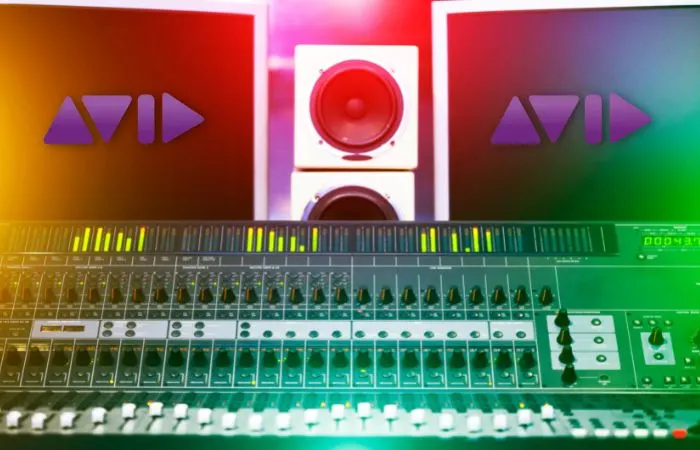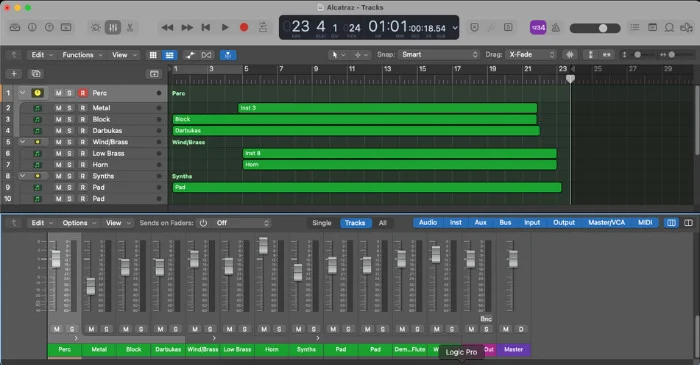Although many people argue that Pro Tools is no longer the industry standard, in my opinion, it still is. The reason for this is its widespread use among professionals and higher-up industries such as film scoring and pro-level mixing/mastering.
Industry Standard DAW
These days, many people argue that Pro Tools is no longer the industry standard due to other DAWs gaining popularity among professional producers/engineers.
While it is true that there is certainly more than one viable option for a music production DAW these days, it does not mean that Pro Tools is not the industry standard.
Although Pro Tools is not my current DAW of choice, I still respect its importance and widespread use among true audio professionals!
In today’s article, we are going to take a look at whether or not Pro Tools is still the industry standard DAW.
Is Pro Tools Still The Industry Standard?

Although there are plenty of great DAWs that you can use to produce professional music, such as Logic Pro, Cubase, REAPER, Ableton, etc., Pro Tools is still the industry standard digital audio workstation, in my opinion.
While this answer is somewhat a matter of opinion, I know that many audio industry professionals would agree with me.
Professional music producers, composers, and audio engineers have relied on Pro Tools as their primary DAW since 1991 and will continue to do so till the end of time.
Why Is Pro Tools Still The Industry Standard?
Here are some of the reasons that I believe Pro Tools is still the industry standard DAW:
- It has been around since 1991, so it has had plenty of time to gain popularity and notoriety in the professional audio/music production scene.
- It is still used in probably 90% of professional music studios and post-production facilities.
- You can use a fully functional DAW for every aspect of music production, from writing and recording to mixing and mastering.
- Beginner music producers and audio engineers are often grandfathered into using Pro Tools by mentors.
Often, it is not a matter of which DAW you prefer; learning Pro Tools is important because of how much the audio industry already uses it.
When Did Pro Tools Become The Industry Standard?
Pro Tools emerged in 1991 and quickly started gaining popularity and a following among the audio community. It became the industry standard music and audio production software in no time.
This is because there were hardly any music production software up to this point and certainly none that could do what Pro Tools can.
Pro Tools revolutionized digital music production, and for this reason, it has been the industry standard DAW since the early nineties.
Why Do Mixing Engineers Use Pro Tools?

Mixing engineers use Pro Tools because it is a full-service DAW that you can use for professional mixing and mastering.
It offers some of the best tools and features for producing and mixing.
Another reason mixing engineers use Pro Tools is because it has been around for so long and has become the industry standard.
Many top studios and production facilities still rely on Pro Tools as their everyday workforce; therefore, mixing engineers tend to use it even though there are plenty of other great options.
Which Artists Use Pro Tools?
Here is a Pro Tools artist list:
- Kanye West
- Dr. Dre
- Pharrell Williams
- Rick Rubin
- Timbaland
- Max Martin
- Ariana Grande
- Paul Epworth
- Brian “Danger Mouse” Burton
- Mark Ronson
Remember that this list is just a short list of some Pro Tools users. There are loads and loads more audio professionals who rely on Pro Tools every day.
Why Do So Many People Use Pro Tools?
Since Avid Pro Tools was released, it immediately started gaining notoriety and popularity among the professional audio community. It was the first audio/music production software that could do what it does. It came packed with features and tools that you can use to write, record, mix, and master professional music of any genre.
Therefore, it quickly became the standard for industry professionals.
Is Pro Tools Hard To Learn?

I think Avid Pro Tools is not much more complicated to learn than any other digital audio workstation.
Any advanced computer software will obviously have somewhat of a learning curve. Still, I believe Pro Tools is not that much steeper than others.
If you are a music production beginner considering learning Pro Tools, I highly recommend it since it is such a popular DAW. Learning Pro Tools is well worth the trouble and effort.
Are There Any Contenders For Pro Tools’ Title Of Industry Standard DAW?

While I do believe that Pro Tools is the current industry standard digital audio workstation, there are certain DAWs that more and more audio industry professionals are starting to rely on these days.
For example, Logic Pro has become a very popular DAW because of its incredible creative capabilities and easy-to-use interface.
Not only do a ton of top film composers use Logic Pro for scoring films, but so does Finneas, Billie Eilish’s brother and producer.
This proves that Logic is an incredible DAW you can use to produce professional music.
Another mighty DAW is Cubase.
One very famous Cubase user is the prolific film composer Hans Zimmer.
Hans has written the scores for lots of films, including Inception, Interstellar, Dune, and too many more to count.
He has been a consistent Cubase supporter over the years and has used it to write some of the most famous scores known to modern film composition.
Although it might not be as popular as Pro Tools or Logic, Cubase is an absolute powerhouse of a digital audio workstation.
While there are plenty of other great DAWs to choose from, such as REAPER, Ableton, Studio One, etc., I don’t believe they are even close to the title of ‘Industry Standard DAW.’
Related Questions
Is Pro Tools a Good Beginner DAW?
Although it has a learning curve, just like any computer software, I think the Pro Tools software is an excellent option for a beginner music producer.
This is because it’s relatively easy to figure out the basics, and being the music industry standard DAW, learning the industry standard first is definitely a smart move!
Does Time Play a Role In Pro Tools’ Popularity?
In my opinion, yes. Because Pro Tools has been around since 1991, it has had over 30 years to grow in popularity and gain a user base.
Other newer DAWs, such as Studio One or REAPER, might not be as popular simply because they haven’t been available as long as Pro Tools has.
Can You Use Pro Tools On Both Mac and PC?
Pro Tools is not limited to a single operating system.
This means that both Windows and Macintosh-based computers can run Pro Tools, unlike Logic Pro, for example.
While most digital audio workstations can run on almost any operating system, it is worth looking into before you commit to a DAW.
Is It Worth The Trouble To Learn Multiple DAWs?
This depends on how serious you are about audio/music production.
For example, if you plan on making a career out of it, learning multiple DAWs (including Pro Tools) is a wise investment you can make.
However, if you are just a music production hobbyist, you can probably stick with one DAW and learn it well.
Final Words
As I have shown you in this article, Pro Tools is still considered the industry standard DAW by most individuals in the audio industry.
Although there are other incredible DAWs on the market, such as Logic Pro, REAPER, Cubase, etc., Pro Tools is the most widely used among professional producers and mix engineers.
For this reason, Pro Tools is still the industry standard digital audio workstation.
Speaking of Pro Tools Studio and industry standards, one of the leading industries to use it is film composing. Click here to read all about how to get into film scoring.

 Want to connect with other music producers for help and guidance?
Want to connect with other music producers for help and guidance?